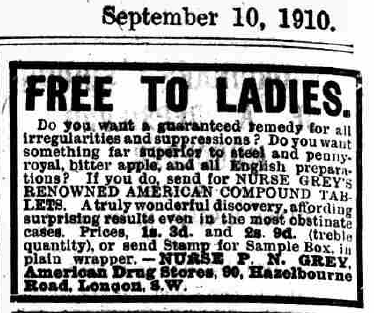1900s secret trade in illicit abortion pills
A plotline for my new novel has been inspired by the shocking underground trade in abortion pills that was common in the early part of the last century. The advert above was from The Illustrated Police News dated 10 September 1910.

Ad in Birkenhead and Cheshire Advertiser 8 October 1910
My interest in the subject was sparked by the BBC2 programme A House Through Time. In the last series, the historian David Olusoga traced the occupants of a house, 10 Guinea Street in Bristol, from the time it was built to the present day.
When the house is rented out, it becomes more difficult to uncover the background of the occupants, especially a mysterious Mrs Watson living there in 1909.
However, in the small advertisement section of a newspaper, a listing mentions a Mrs Watson, described as a ‘Lady Specialist’, living at 10 Guinea Street.
The ad is clearly aimed at women, but the wording is cryptic, ‘Try Mrs Watson’s Steel and Penny Royal Pills – a Safe and Certain remedy’.
A ‘safe and certain’ remedy for what?
‘More Secret Remedies’ is a report published by the British Medical Association in 1912, covering the topic of nostrums (medicines prepared by an unqualified person and generally considered not to be effective).

According to the British Medical Association report, the herb pennyroyal was thought to be able to induce abortions. Penny Royal and Steel Pills were sold illicitly through newspaper ads, targeting women who wanted to end their pregnancy.
It turns out that Mrs Watson was a pseudonym used by herbalist James Stewart, who had an illegal business peddling remedies for unwanted pregnancy and sexual dysfunction.
A search in the British Newspaper Archive shows that these types of advertisements were common in the early part of the twentieth century. I came across dozens of them spanning the early 1900s through to 1928.


In a time when abortion was illegal and giving birth to ten or more children was not uncommon, it's sad to think how many women were desperate enough to send off for these pills.
The Iris Woodmore Mysteries are available in hardback, paperback, ebook and audiobook from Amazon and bookstores.

